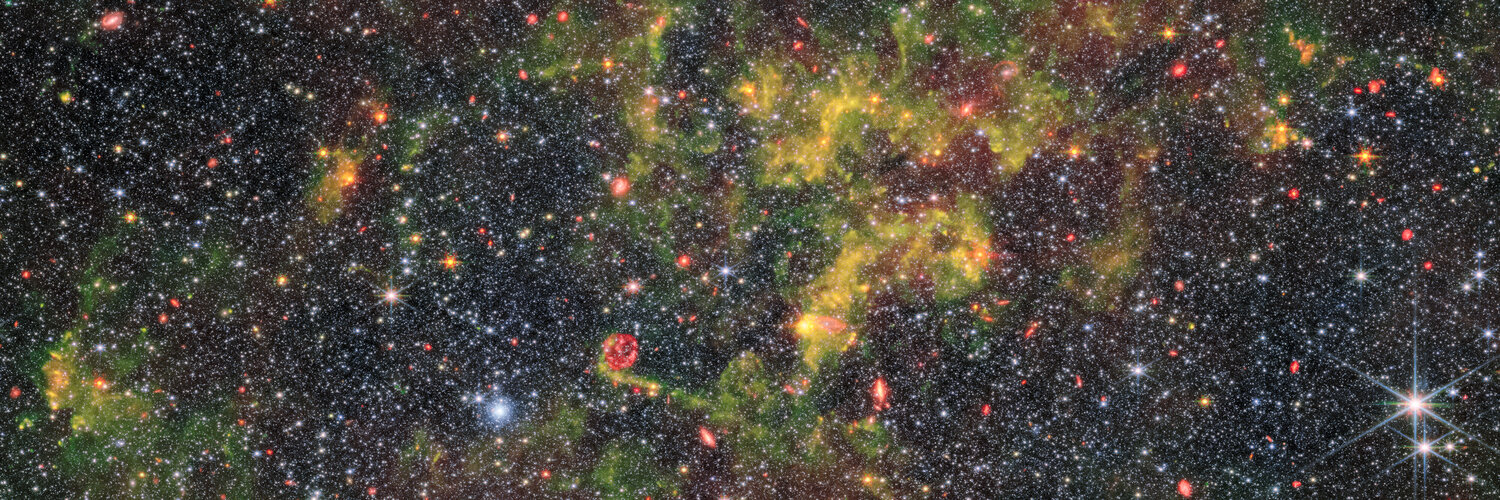
Copernical Team
Euclid test images tease of riches to come

Euclid’s two instruments have captured their first test images. The mesmerising results indicate that the space telescope will achieve the scientific goals that it has been designed for – and possibly much more.
Elements: FIRE
 Video:
00:33:08
Video:
00:33:08
The summer fire season is well under way in Europe – countries all around the Mediterranean are experiencing record temperatures coupled with huge wildfires that have led to mass evacuations. In this enthralling new ESA documentary, explore how people on the frontline are using space to better monitor and fight the flames.
Follow the incredible stories of the firefighters who dealt with unprecedented fires in Gironde, France, and the forest officers using satellite data to plan for the forests’ recovery. Journey into the heart of Earth's elemental might and discover how space is changing the game for monitoring
Mystery object on Australian beach identified as part of Indian rocket

A mysterious object that washed up on an Australian beach has been identified as debris from an Indian rocket, officials said Monday.
The bulky barnacle-encrusted cylinder was first spotted in mid-July near remote Jurien Bay, a coastal region two hours' drive north of Perth in Western Australia.
Amateur sleuths speculated online that the object might have a military origin or even be linked to the disappearance of Malaysian Airlines flight MH370.
But the Australian Space Agency said it had concluded the object was "most likely" debris from an "expended third-stage of a Polar Satellite Launch Vehicle".
The medium-lift launch vehicle is operated by the Indian Space Research Organization, the agency added.
The object, which measures some two meters (six feet) high and has cables dangling from the top, is being kept in storage.
Meanwhile, officials from both countries are working together to "provide further confirmation to determine next steps, including considering obligations under the United Nations space treaties", the Australian Space Agency said.
It is not the first time Australia has found itself a landing ground for space junk—last August, a sheep farmer in New South Wales found a charred chunk from one of Elon Musk's SpaceX missions jutting out of his paddock.
Beam-hopping JoeySat passes in-orbit tests

An advanced broadband satellite providing high-speed internet services that demonstrate next-generation 5G connectivity has passed its initial in-orbit tests.
The life and times of dust
 Image:
Image:
This image shows the irregular galaxy NGC 6822, which was observed by the Near-InfraRed Camera (NIRCam) and Mid-InfraRed Instrument (MIRI) mounted on the NASA/ESA/CSA James Webb Space Telescope. As their names suggest, NIRCam and MIRI probe different parts of the electromagnetic spectrum. This allows the instruments to observe different components of the same galaxy, with MIRI especially sensitive to its gas-rich regions (the yellow swirls in this image) and NIRCam suitable for observing its densely packed field of stars.
NGC 6822 lies about 1.5 million light-years away, and is the Milky Way’s nearest galactic neighbour that
SatSure Partners with Rabo Partnerships to Revolutionize Cash Flow-based Lending for Smallholder Farmers
 SatSure, a global leader in EO space data applications, is pleased to announce its partnership with Rabo Partnerships. This strategic collaboration aims to drive the access to cash-flow based lending for smallholder farmers globally. The alliance aligns with SatSure's Banking Solution, SatSure Sage, a suite of applications designed to empower lending institutions for farmer financial inclusion,
SatSure, a global leader in EO space data applications, is pleased to announce its partnership with Rabo Partnerships. This strategic collaboration aims to drive the access to cash-flow based lending for smallholder farmers globally. The alliance aligns with SatSure's Banking Solution, SatSure Sage, a suite of applications designed to empower lending institutions for farmer financial inclusion, NASA-led Mission to Map Air Pollution in 3D Over Megacities
 This summer, as wildfire smoke blankets large swaths of North America and heat-stoked summer haze reaches its seasonal peak, NASA and its partners are deploying several new tools to observe air quality and pollution from the street to the stratosphere.
Launched into orbit earlier this spring, TEMPO, short for Tropospheric Emissions: Monitoring of Pollution, is the first satellite instrumen
This summer, as wildfire smoke blankets large swaths of North America and heat-stoked summer haze reaches its seasonal peak, NASA and its partners are deploying several new tools to observe air quality and pollution from the street to the stratosphere.
Launched into orbit earlier this spring, TEMPO, short for Tropospheric Emissions: Monitoring of Pollution, is the first satellite instrumen Robot grips intuitively and moves objects like a human
 Agile Justin knows how to grasp objects correctly - even if it does not recognise them yet. The humanoid robot can also turn these items in its hand in any desired direction - without looking. This is commonplace for humans, but extremely difficult for robots. A team from the German Aerospace Center has now trained a robot to acquire these highly complex skills. To do this, the researchers used
Agile Justin knows how to grasp objects correctly - even if it does not recognise them yet. The humanoid robot can also turn these items in its hand in any desired direction - without looking. This is commonplace for humans, but extremely difficult for robots. A team from the German Aerospace Center has now trained a robot to acquire these highly complex skills. To do this, the researchers used Space storms could cause chaos without forecast developments
 The world is unprepared for the next big storm from outer space, an overwhelming majority of scientists agree.
Nine in ten space weather experts said that without accurate forecasting of space weather, Earth would suffer serious damage to its infrastructure. Of the 144 scientists surveyed on the dangers of geomagnetic storms, just over half said current forecasting capabilities were not go
The world is unprepared for the next big storm from outer space, an overwhelming majority of scientists agree.
Nine in ten space weather experts said that without accurate forecasting of space weather, Earth would suffer serious damage to its infrastructure. Of the 144 scientists surveyed on the dangers of geomagnetic storms, just over half said current forecasting capabilities were not go Voyager 2 goes silent with a temporary communication interruption with Earth
 Amidst its epic journey into the cosmos, NASA's Voyager 2 spacecraft has temporarily lost contact with the blue planet. An accidental deviation of the antenna's alignment on July 21 has caused an unexpected silence in the spacecraft's interstellar communications.
Voyager 2, nestled over 12.3 billion miles (19.9 billion kilometers) away from Earth, slightly misaligned its antenna by 2 degre
Amidst its epic journey into the cosmos, NASA's Voyager 2 spacecraft has temporarily lost contact with the blue planet. An accidental deviation of the antenna's alignment on July 21 has caused an unexpected silence in the spacecraft's interstellar communications.
Voyager 2, nestled over 12.3 billion miles (19.9 billion kilometers) away from Earth, slightly misaligned its antenna by 2 degre 
